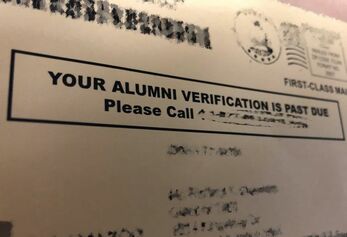
Did I miss a bill payment? Neglect to pay a parking ticket? Forget to renew a magazine?
None of the above. No, it seems that I failed to update my personal information in my old school’s alumni database—and thus missed the opportunity for a marketing firm to sell me stuff.
This is why so many people despise marketing and public relations.
For the record: I reached out to my alma mater and shared my concern. (Out of respect for the school and its good people, I’m leaving out names.) The alumni director, a delightful and dedicated person who has no staff support, explained that the school lacks internal resources to keep the alumni database up to date. That hurts the school's ability to stay in touch with its former students. Thus it contracted with an out-of-state marketing firm with a 50-year track record of successfully gathering this data. Their compensation: the profit from selling school-branded stuff to those who respond.
I sympathize with the school and the alumni director. In fact, after hearing this explanation (and knowing I'd missed the "deadline"), I initially decided not to blog about this—until yet another pair of notices arrived. For the sake of the profession, I can’t let it go.
I have no problem with the marketing firm’s basic model—provide a service to the school, profit off sales. However, I do have immense problems with its approach.
One, it’s deliberately deceptive. The firm forcefully presents its message as if there’s an urgent deadline you are expected—just short of “required”—to meet. Both the American Marketing Association and the Public Relations Society of America have ethical codes that stress truth and transparency. Hard to see how these mailings “foster trust in the marketing system … [by] avoiding deception in product design” (AMA) or “build respect and credibility with the public” (PRSA).
Two, it hurts the most vulnerable people. In Michigan alone, 43% of households are either in poverty or struggling to make ends meet—what’s known as ALICE (Asset Limited, Income Constrained, Employed). Imagine you’re among them. Imagine you’re already behind on your bills; you get your share of actual past-due notices every month. The stress and anxiety are enormous. And then a postcard shouting “PAST DUE” arrives. Sure, a moment’s attention will make clear this isn’t another bill or a collection agency threat. But the moment before then is frightening, cruel and unnecessary.
Three, it fosters distrust of professional communicators. In an era where politicians call news media “the enemy of the people,” when some spokespersons lie with aplomb, and when some (wrongly) consider "spin" a tool of the trade, this approach trashes the credibility of everyone in the field—every marketing firm, every PR professional, and every organization that employs them.
What could the marketing firm do differently? Simple: Be honest. Had I received an email or postcard explaining the arrangement and asking me to respond, I would have gladly updated my file and tolerated a short sales pitch. Heck, I might have even bought something. Now? No way.
What should we as marketing and communications professionals do? Call out this behavior. Refuse to participate in it. Embrace the ethics of our respective fields and hold each other to a higher standard.

 RSS Feed
RSS Feed
